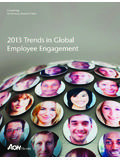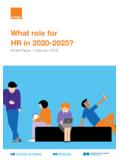Transcription of Employee Wellbeing Research 2017 - Punter …
1 Employee Wellbeing Research 2017 The evolution of workplace Wellbeing in the UK 349 Published by the Reward & Employee Benefits Association In association with The authors This report was devised by Debi O Donovan and Phil Hayne of REBA in association with Punter Southall health & Protection. The Research was conducted and written by Graham Brown, edited by Anna Scott and designed by SallyannDesign. REBA 2017 . Published by Reba Group Ltd, 7c Vera Road London SW6 6RW United Kingdom. contributorsLouise Astonwellbeing director, Business in the CommunityKevin Basscompensation and benefits manager, AllianzGraham Brownhead of Research , Reward & Employee Benefits AssociationProfessor Sir Cary Cooper50th anniversary professor of organisational psychology and health , ALLIANCE Manchester Business School, University of ManchesterPeter Brownhead of health & Work Branch, health and Safety Coxfitness director, Iris WorldwidePaul Farmerchief executive, Mind, and chair, Mental health TaskforceCharlotte Frostbenefits & Wellbeing manager, SchrodersClaire Hallmeyhealth and Wellbeing manager, OracleAndrew Kinderchair, The UK Employee Assistance Professionals AssociationCatherine Rickardsenior Research fellow, Institute for Employment StudiesAndrea Shipmangroup compensation & benefits manager, City Football GroupBridget Gilmourvice president, IOSHR achel Suffemployment relations adviser.
2 CIPDREBA/ Punter Southall health & Protection Employee Wellbeing Research evolution: how employers are embracing Employee wellnessAs more employers understand the business benefits of Employee Wellbeing and broaden its scope of coverage, what ethical considerations should they make?We have witnessed a tremendous increase in interest in Employee Wellbeing strategies over the past few years. But we are aware that such strategies are still in their infancy in the Research is based on the answers of those employers with some degree of engagement in Wellbeing they are either already running schemes or plan to start within the next few years. It does not capture the vast majority of employers out there yet to realise the business benefits of Employee Wellbeing . But they will in world of work is changing around us with the rise of digital devices and computerisation and an increasingly agile and piecemeal-based labour market (as opposed to a permanently-employed one).
3 These changes bring about new challenges for us a society, and as employers. How will the people who work for us, in whatever capacity, be treated? Does Employee Wellbeing mean offering initiatives to keep people productive and working like finely-tuned cogs in a machine, or is it about having a culture of caring for employees as human beings? The line is very fine and needs to be carefully digital device that measures Employee data to assist with performance and health can be a great tool for both employer and Employee . But it has the potential to become a way to discriminate against certain groups of staff. How long before staff who refuse to wear certain devices are told they cannot get certain Wellbeing benefits, must pay more for insurances, or have their performance reviews linked to their health ? This Research reflects the exciting developments in Wellbeing ahead employers are willing to embrace digital devices. But ethical questions must be asked every step of the the majority of our respondents, Employee Wellbeing is still primarily focused on physical and mental health .
4 But for those at the vanguard, Employee Wellbeing is becoming the new total reward, the new Employee engagement. These forward-thinking reward and Employee benefits practitioners consider Wellbeing to encompass broader emotional and financial health to employers doing very good work in the Wellbeing space, we at REBA can see a huge variance in practices. For some a Wellbeing strategy means having a comprehensive range of initiatives, for others it is vital that any such initiatives are tied into business objectives and measured against very few employers doing it really well can demonstrate the data at board level across a range of measures. But you can bet they didn t start that way. Someone had to press the case, persuade senior leadership to back them, and gradually build it over the years, learning what works for their particular organisation along the benefits package is one-size-fits-all. This is especially true of Employee Wellbeing . Workplace culture is crucial to the success or failure of Wellbeing strategies and initiatives.
5 And cultures differ completely across senior leaders and line managers are seen to act will have a bigger effect on workplace Wellbeing than anything an HR, reward, benefits or Wellbeing practitioner can implement. Wellbeing is all about people caring for O DonovanPartner | Reward & Employee Benefits Association summary ..6 Growing up: the advance of Wellbeing in the workplacePractitioner view ..14 What reward and benefits professionals say about Wellbeing strategies1. Wellbeing strategies ..16 Making headway: Employee Wellbeing strategies gain ground across companies 2. Wellbeing budgets and spending ..23 Levelling out: organisations with strategies will keep budgets constant3. Wellbeing initiatives and activities ..26 The people s choice: a wide range of Wellbeing benefits old and new are available to employees4. Changes to the working environment ..37 A change is as good as a rest: encouraging healthy behaviours at work5. Supporting Wellbeing .
6 40 Down the line: training line managers to help communicate Wellbeing benefits 6. Measuring Rules of thumb: gauging the success of Wellbeing investment Appendix 1: About the survey ..51 Appendix 2: Full list of respondents ..53 Appendix 3: Who we are ..54 Have you read our New Model Reward Research 2017 ? Download your copy of the REBA/JLT New Model Reward Research 2016 here: by the Reward & Employee Benefits Association In association with New Model Reward 2017 How legislative, economic and societal changes are re-shaping employers pay and pensions strategies over the next 10 years 349 REBA/ Punter Southall health & Protection Employee Wellbeing Research : a happy and healthy workforce will be more productive and engagedAs the focus on Wellbeing gathers steam, now is the time for employers to share best practice on managing Employee the second year of partnering REBA to carry out Research into Employee Wellbeing , we are encouraged to see that the number of respondents with a defined Wellbeing strategy in place has grown by about 20 per cent since last year s survey.
7 This positive step demonstrates that Employee Wellbeing is no longer nice to have , but an area of focus that is growing in importance for UK trendsWhat can we expect on the Wellbeing horizon for 2017 ? We anticipate that Employee Wellbeing will continue to rise up the corporate agenda. More and more organisations are realising the positive impact that looking after their employees can have on their overall engagement, health and current Wellbeing programmes, the focus on mental health and physical activity continues to be important, so Employee assistance programmes (EAPs), discounted gym memberships and health screenings will remain popular initiatives. We can also see increased attention on supporting financial Wellbeing and promoting good sleep areas of focusPhysical and mental health continue to dominate Wellbeing , which is not surprising when we consider that employers have seen a rise in the number of staff with mental health problems (up 41%, according to the CIPD s Absence Management 2016 survey).
8 Public awareness of mental illness through campaigns such as Time to Change (set up by charities Mind and Rethink Mental Illness in 2009) has grown over the last five years but there is still a stigma attached to mental illness when compared with physical illness. More can and must be done by employers to help employees with a mental illness, both by providing access to support services such as counselling, mental health first aiders and EAPs, but also by providing line manager training in how to support and manage employees with a mental health condition. Line managers must be properly equipped to support the company s overall Wellbeing strategy. Culture and environmentAlthough mental and physical health are often considered top priorities, it s worth emphasising that in order for a Wellbeing programme to be effective, organisations need the right culture and workplace environment too. This includes designing the workplace to promote healthy behaviour, and offering facilities such as showers and access to drinking water.
9 The culture and environment you create can influence the choices your employees make and their overall Technological developments are a growing feature of Wellbeing programmes wearable fitness devices, apps to measure sleep and online Wellbeing advice are a few examples. Technology has the power to provide aggregate data so that employers can review the progress of their Wellbeing programme. It also enables you to reach a diverse workforce across multiple locations. It s good to see that more employers are measuring the effectiveness of their Wellbeing strategy and the impact it has on their workforce. However, further improvements in this area are needed to ensure continuous funding for Wellbeing programmes. I believe we now need to start sharing best practice so we can learn from each other and share the available information. One thing is clear: a happy and healthy workforce is likely to be a more productive and engaged workforce. Looking after your Employee Wellbeing is a win-win for everyone.
10 Beate O NeilHead of Wellbeing consulting | Punter Southall health & ProtectionREBA/ Punter Southall health & Protection Employee Wellbeing Research summaryGrowing up: the advance of Wellbeing in the workplaceEmployers are rolling out Wellbeing strategies for their workplaces at a rate never seen before. Some are highly sophisticated with strategic links to business culture and board reporting. Others are simply a collection of Wellbeing of Wellbeing strategies to rise rapidlydata Over half of respondents ( ) have no Wellbeing strategy in place. Virtually all of this group plan or wish to implement one: insight There is a tremendous growth in the number of carefully-formulated Wellbeing strategies being implemented in UK workplaces, with the trend set to grow for years to come (bearing in mind this Research captures those respondents already engaged with the concept).Most Wellbeing strategies are under three years olddata Of those with a Wellbeing strategy, around a quarter have had their strategy in place for more than three We can see how recent the growth in Wellbeing strategies is.





